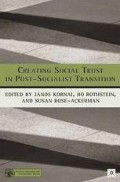Abstract
According to Russian common opinion “Nothing is as strong or as weak in Russia as it seems.” This includes the financial system. Few claim to understand fully either the origins of the August 1998 financial crisis or the postcrisis recovery. Post-1998 analyses suggested that reforms did not work as expected because the institutional environment required by market democracies was not in place.This in turn was explained by sociohistorical and cultural factors responsible for the lack of civil society, civic responsibility, and business ethics.As The Economist put it, a healthy banking system requires
honest administrators backed by determined politicians, a legal system in which loans make sense and a financial climate in which people want to lend. All the above are missing in Russia. This is why a whole year since August 1998, not a single significant bank pushed into insolvency has been properly wound up. The World Bank estimated that at the top 18 banks alone, liabilities exceed assets by $9.8 billion. Of the few banks that have lost their licences in 1999, most were those trying to deal honestly with their creditors … Strangest of all, there has been no official censure of the widespread asset-stripping and book-fiddling which followed the August crisis
Access this chapter
Tax calculation will be finalised at checkout
Purchases are for personal use only
Preview
Unable to display preview. Download preview PDF.
References
Aleksashenko, Sergei V. and the Bureau of Economic Analysis. 2000. Obzor Ekonomicheskoi Politiki Rossii za 1999 god (Survey on Economic Policy in Russia in 1999 ). Moscow: TEIS
Bennett, Gordon. 2000. The Federal Security Service of the Russian Federation. Working Paper C102. Surrey: Conflict Studies Research Centre.
Benson, Bruce and John Baden. 1985. The Political Economy of Governmental Corruption: The Logic of Underground Government. Journal of Legal Studies 14: 391–410.
Blundo, G. and Jean-Pierre Olivier de Sardan. 2001. La Corruption Quotidienne en Afrique de l’Quest. Politique Africaine 83: 8–37.
Commander, Simon and Christian Mummsen. 2000. The Growth of Non-Monetary Transactions in Russia: Causes and Effects. In P. Seabright (ed.). Vanishing Rouble: Barter Networks and Non-Monetary Exchanges in Post-Soviet Societies, pp. 114–46. Cambridge, UK: Cambridge University Press.
Klebnikov, Paul. 2000. Godfather of the Kremlin: The Life and Times of Boris Berezovsky. Harcourt Paperbacks ( Florida, USA).
Lambert, Larry B. 1996. Underground Banking and National Security. In Sapra India Bulletin, March, at http://www.subcontinent.com/sapra/bulletin/bulletin.html
Latynina,Yulia, 1999. Okhota na Izyubrya (The Deer Hunt). Moskva: Olma-Press.
Ledeneva, Alena V. 1998. Russia’s Economy of Favours. Cambridge, UK: Cambridge University Press.
Ledeneva, Alena V. 2000a. Economic Crime in the New Russian Economy. In A.V. Ledeneva and M. Kurkchyan (eds.). Economic Crime in Russia, pp. 1–16. Kluwer Law International.
Ledeneva, Alena V. 2000b. Russian Hackers and Virtual Crime. In A.V. Ledeneva and M. Kurkchyan (eds.). Economic Crime in Russia, pp. 162–76. Kluwer Law International.
RFE/RL. 2000a. RFE/RL Security Watch, August 28, at http://www.rferl.org/securitywatch/
RFE/RL. 2000b. RFL/RL Security Watch, October 9, at http://www.rferl.org/securitywatch/
RFE/RL. 2000c. RFL/RL Newsline, October 17, at http://www.rferl.org/newsline/2000/10/171000.asp
RFE/RL. 2001. RFL/RL Newsline, February 9, at http://www.rferl.org/newsline/2001/02/090201.asp
Sapra. 1996. Sapra India Bulletin 1996, February–March at http://www.subcontinent.com/sapra/bulletin/96feb-mar/si960308.html
Shenfield, Stephen. 1983. Pripiski: False Statistical Reporting in Soviet-type Economies. In M. Clarke (ed.). Corruption: Causes, Consequences and Contro, pp. 239–58. London: Francis Pinter.
Tikhomirov,Vladimir. 1997. Capital Flight from Post-Soviet Russia. Europe-Asia Studies 49: 591–615.
Tompson, William. 1997. Old Habits Die Hard: Fiscal Imperatives, State Regulations and the Role of Russia’s Banks. Europe-Asia Studies 49: 1159–85.
Varese, Federico. 2000. Pervasive Corruption. In A.V. Ledeneva and M. Kurkchyan (eds.). Economic Crime in Russia, pp. 99–111. The Hague: Kluwer Law International.
Volkov,Vadim. 1999. Violent Entrepreneurship in Post-Communist Russia. Europe-Asia Studies 51: 741–54.
Volkov,Vadim. 2000. Between Economy and the State: Private Security and Rule Enforcement in Russia. Politics and Society 28: 483–501.
Volkov,Vadim. 2002. Violent Entrepreneurs: The Use of Force in the Making of Russian Capitalism. Ithaca, NY: Cornell University Press.
Yakovlev, Andrei. 1999. Black Cash Tax Evasion in Russia: Its Forms, Incentives and Consequences at Firm Level. BOFIT Discussion Paper No. 3. Helsinki: Bank of Finland.
Yakovlev, Andrei. 2000. Pochemu v Rossii Vozmozhen Bezriskovyi Ukhod ot Nalogov (Why is Non-Risk Tax Evasion Possible in Russia?). Voprosy Ekonomiki No. 11, pp. 134–52.
Editor information
Editors and Affiliations
Copyright information
© 2004 János Kornai, Bo Rothstein, and Susan Rose-Ackerman
About this chapter
Cite this chapter
Ledeneva, A.V. (2004). Underground Financing in Russia. In: Kornai, J., Rothstein, B., Rose-Ackerman, S. (eds) Creating Social Trust in Post-Socialist Transition. Political Evolution and Institutional Change. Palgrave Macmillan, New York. https://doi.org/10.1057/9781403980663_5
Download citation
DOI: https://doi.org/10.1057/9781403980663_5
Publisher Name: Palgrave Macmillan, New York
Print ISBN: 978-1-349-52814-1
Online ISBN: 978-1-4039-8066-3
eBook Packages: Palgrave Political & Intern. Studies CollectionPolitical Science and International Studies (R0)

